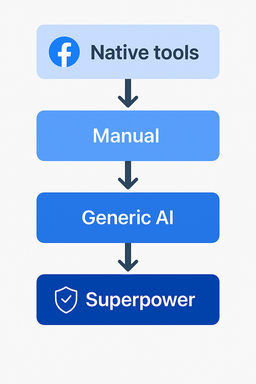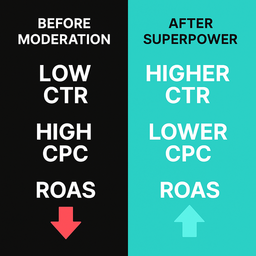January 16, 2026
A clear operator-first escalation ladder for knowing exactly when to involve support, legal, or leadership on Instagram.
Aug 26, 2025
9 Min
Learn how to handle spam comments on Facebook ads to protect ROAS. Discover why native tools fail, why generic AI misses nuance, and how Superpower offers real-time, customizable moderation.

If you’re running Facebook ads, you’ve likely seen it: your creative is strong, targeting is on point, spend is flowing… but then the comment section fills with spam. Fake promos, sketchy links, bots pushing crypto scams, or trolls shouting “scam.”
At first, it feels like an annoyance. But dig deeper, and spam comments do real damage. They undermine trust, drag down CTR, and ultimately cut into your ROAS (Return on Ad Spend).
This article breaks down exactly how spam comments hurt performance, why Meta’s native tools aren’t enough, what founders try (and why it doesn’t scale), and how advanced, customizable AI moderation like Superpower can protect your ads 24/7.
When a potential buyer sees “scam” or sketchy links in your ad’s comments, it plants doubt—even if your product is legit. That pause can be the difference between a click and a scroll.
Facebook’s algorithm notices engagement quality. If threads get flooded with irrelevant or spammy interactions, your CTR drops, your CPC rises, and Meta sees your ad as lower quality. That means worse delivery and wasted spend.
Unlike DMs, comments are public. Spam and troll posts live under your creative for all prospects to see. That damages brand perception at scale.
Meta lets you hide or delete comments, but doing this manually across multiple campaigns eats up founder time—or requires assigning a staff member to babysit ads.
You can block specific words or phrases, but spammers get around this easily. For example, instead of typing “scam,” they’ll write “$c@m.” Keyword filters simply can’t keep up.
The biggest gap: comments pile up fast. Even if you eventually delete them, the damage to ROAS is already done.
Some founders throw people at the problem—interns or offshore freelancers tasked with comment cleanup. It works short-term, but it’s expensive and slow.
Others put disclaimers in captions like “ignore fake links in the comments.” It signals awareness, but it doesn’t actually fix the problem.
Some tweak targeting to reduce exposure to spam-prone regions, but this cuts reach and potential sales.
As soon as you spend at scale, spam grows with you. Manual approaches collapse under volume.
Most AI moderation tools bucket comments into positive, negative, or neutral. That’s too blunt for real-world ad comments.
Example: “Love it, but too expensive.” Is that positive or negative? A generic AI won’t know what to do, so it gets ignored—leaving objections or detractors live under your ads.
If someone comments “Is this legit?” it’s actually a buying signal. But generic AI often flags it as negative and deletes it—killing a sales opportunity.
Every brand has unique sensitivities. Some want to allow “expensive” if paired with praise, others don’t. Generic AI doesn’t let you fine-tune.
Superpower lets you create nuanced, brand-specific instructions. If you want to hide all pricing complaints but keep product praise—even in the same sentence—you can.
Spammers and bots don’t wait. Superpower acts instantly, hiding spam comments before they’re seen by your audience.
Unlike interns or agencies, Superpower doesn’t sleep. Your ads stay clean around the clock, across time zones.
Instead of blunt sentiment filters, Superpower adapts to your tone, style, and business rules.
By keeping threads free of spam, trolls, and competitor plugs, Superpower ensures engagement stays positive—boosting CTR and reducing wasted spend.

Quick win—add profanity and obvious spam keywords. It won’t catch everything, but it’s a baseline.
Have someone check ad threads once per day to catch anything urgent.
Deploy Superpower’s customizable moderation rules to handle spam instantly and at scale.
Iterate on your rule set. The more campaigns you run, the smarter your moderation becomes.

Spam comments are more than an eyesore—they’re a silent profit killer. They damage trust, suppress engagement, and chip away at your ad efficiency until ROAS collapses.
While Meta offers native tools, they’re limited to filters and manual deletes. Manual fixes (interns, disclaimers, targeting tweaks) only delay the inevitable. And generic AI moderation is too blunt to handle the nuance of real-world ecommerce ads.
That’s why founders scaling paid social need a stronger defense. With customizable instructions, real-time spam removal, and brand-aligned AI, Superpower.social ensures your Facebook ads stay clean, credible, and conversion-ready—24/7.
Protect your ROAS. Don’t let spam run your ad comments.

Q1: Can I turn off comments on Facebook ads?
Yes, but it’s not recommended. Comments boost engagement signals. Better to moderate than remove.
Q2: Do spam comments really affect ROAS?
Absolutely. They reduce CTR, increase CPC, and signal low-quality engagement to Meta’s algorithm.
Q3: Why aren’t Meta’s native filters enough?
They only block exact matches. Spammers adapt quickly with variations like “$c@m.”
Q4: How does Superpower handle nuance in comments?
Unlike sentiment filters, Superpower uses customizable rules, catching subtle spam without deleting real engagement.
Q5: Can Superpower work alongside my team’s manual moderation?
Yes. Many brands combine both—manual oversight for edge cases, Superpower for real-time automation.
What’s the worst spam you’ve seen under your ads? Share it below—we’ll feature the funniest (or most painful) in a future roundup.

Explore expert tips, industry trends, and actionable strategies to help you grow, and succeed. Stay informed with our latest updates.